This year-long seminar was structured around the idea that the concept of the Anthropocene challenges us to rethink our basic humanistic values: the centrality of speech for human expression, rational thought, the ability to reason and communicate, the demand for freedom, democracy, justice and human rights, and the creation of cultural expressions based on enlightenment values.
In close consultation with the seminar participants, we examined issues such as global migration, climate change, extinction, cultural and biological diversity, environmental justice, sustainability, the agency of nature, and the need for rethinking human and nonhuman relations, from a variety of disciplinary perspectives.
In Fall we read Agamben on animal nature, visited the “Human Nature, Animal Culture” exhibit at the Frye Museum, debated our obligations to fellow creatures from a philosophical perspective, and discussed Albert Schweitzer’s attitude of reference for life.

In Winter we discussed Amitav Gosh’s theses about climate change, E.O. Wilson’s ideas about the unity of knowledge, and Clare on freaks and queers. We also analyzed the film “Fantastic Fungi,” and met with a guest from the Scandinavian Department, Prof. Olivia Gunn, to discuss questions of gender and postcolonialism with respect to nature. Two field trips led to a discussion of wolf recovery in Washington state with a representative from Fish & Wildlife and artist books in Special Collections.
In Spring we rented three Burke boxes and analyzed their content around the themes of geology, rock & minerals, and native conceptions of the natural environment.
Please read the student testimonials below to hear from their perspective! I am so thankful to them for giving me a chance to learn from them.
Best, Sabine
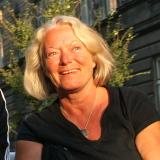
-----------------------------------------------------------------------------------------------------------------------------------------------------
Karin Filipsson: Frye Museum: Human Nature, Animal Culture
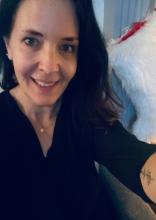
“While we turn to science for solutions to address this crisis, we can look to art to understand our past, present, and future relationships with our fellow creatures”.
In my research I have found myself focusing on the concept of postmemory, in particular the experience of the second generation of Holocaust-survivors, as they are describing their relationship to Sweden’s cultural memory of WWII as well as to the trauma of their parents’ memories of escaping the Holocaust. My research investigates the fluidity of memory, story, genre and the understanding that experiences and memories of trauma can have intergenerational effect. My participation in the Hanauer seminar has reminded me to always be aware of any project’s relation to history and of my own positionality within history, academia, Western civilization as well as the storyteller of my life.
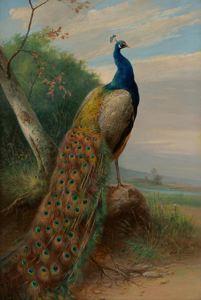
Our joint excursion to the Frye Museum in the early days of the Hanauer seminar 2021-2022 set the tone for the way the seminar always helped us ground our discussions and ourselves as scholars both in the history of Western civilization and in the practice of consistently questioning the first impression or understanding of any concept, art, or text. For example, the painting of the peacock kept coming up in our discussions, as the unexpectedly anthropomorphic animal in the exhibition Human Nature, Animal Culture or perhaps, intriguingly, as the animal with agency among animals portrayed without agency? The fact that we could not fully agree¾or decide¾on the role of (or the intention behind the portrayal of) the peacock is the reason why I decided to submit this picture at the end of the seminar. I chose the text The Lives of Animals by J M Coetzee for this part of our seminar and I still find the combination of the art exhibition and Coetzee’s text to be especially important to my research as the text and the exhibition both raise questions regarding genre, message and reception of art/literature/academic research.
-----------------------------------------------------------------------------------------------------------------------------
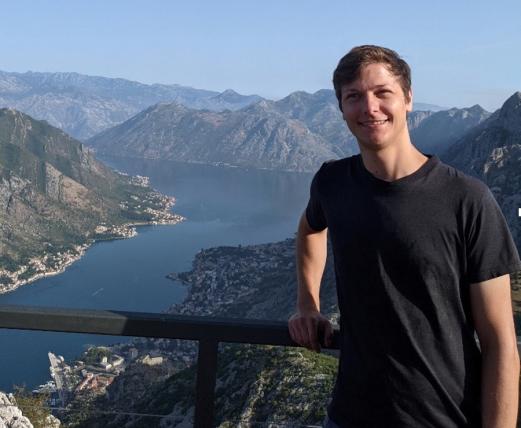
Detlev Weber is a Ph.D. candidate in the Department of German Studies at the University of Washington, Seattle. His dissertation explores the literary wolf in medieval texts with an eye on German Romantic reception. While the literary wolf frequently emphasizes outsiderdom it is also a social pack animal. The socio-political constellations which arise from this contrast present curious interplays of liminality which can serve much to better understand human societies and interconnections. Particularly the discussion with Wolf Coordinator Julia Smith from the Department of Fish and Wildlife has been a boon to better understanding the comparison between the biological animal and the literary figures likened to them. Also reading Agamben’s “Homo Sacer” together with this wonderful group of Hanauer members has been very rewarding for contextualizing his work with a more ecocritical perspective.
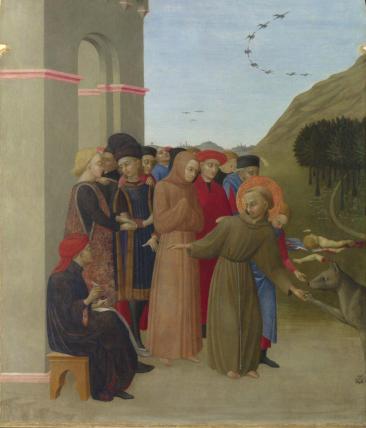
The Wolf of Gubbio, Sassetta
---------------------------------------------------------------------------------------------------------------------------------------------
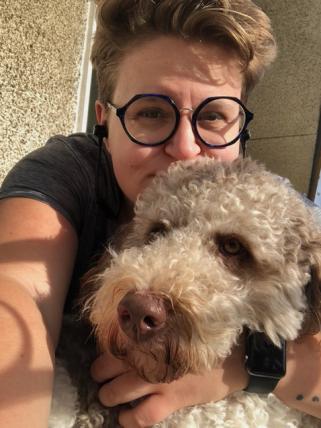
Diana Molkova is a PhD student in the Classics department. Her research interest lies in lived experiences of marginalized people in Rome, in particular enslaved women. Since there are little to no extant evidence that reflects their perspective, Diana turns to modern critical theory to help envision what that perspective could have been. Her dissertation explores how women of different social statuses could have engaged with imagery of sexual violence. The chapter currently under works focuses on clay lamps—items ubiquitous in Roman households—that bear scenes of people with dwarfism having sex. These images were possibly a reflection of public performances, because sexuality of people with dwarfism was fetishized in antiquity. In thinking about these people’s agency, as well as how they were viewed by other disabled and non-disabled people, Diana has found work of Eli Clare helpful, and she brought one of his essays, “Freaks and Queers”, to discussion with other Hanauer fellows. This conversation, as well as readings about speaking/advocating for entities incapable of human speech were helpful to her work.
-----------------------------------------------------------------------------------------------------------------------------------------------
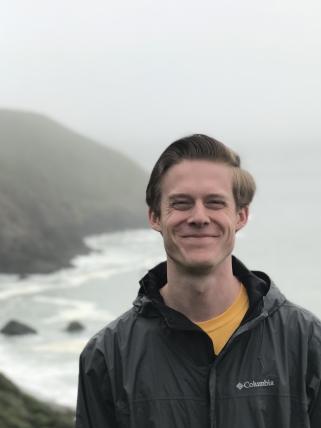
Aaron Barker is a PhD student in the Department of Philosophy. He is broadly interested in 18th and 19th century German philosophy and he plans to focus his dissertation on Immanuel Kant and Arthur Schopenhauer’s views on character and moral improvement. More specifically, his research centers on the related concepts of rationality, moral motivation, and the ways in which we should understand self-deception, evil in human nature, and individual moral progress.
Aaron has found the Hanauer Seminar to be an invaluable experience thanks to the variety of perspectives offered by the other Fellows and the chance to engage with new and underappreciated material. While all the works discussed in the Seminar have prompted much critical reflection and brought new insights into his own research, Aaron found the discussions surrounding Christine Korsgaard’s “Fellow Creatures”, J.M. Coetzee’s “The Lives of Animals”, and Albert Schweitzer’s “Reverence for Life” to be particularly enriching and relevant, thanks to the other Fellows’ insightful comments on the nature of reason and the consequences of self-deception.
The Hanauer Seminar has also led Aaron to an interest in interdisciplinary work, and he hopes to engage in collaborative programs in the future as a way to promote meaningful communication among academics both in their roles as researchers and as instructors.
-------------------------------------------------------------------------------------------------------------------------------

Anna Malin Gerke is a doctoral student at the Department of German Studies. With a broad research interest and background, she applies linguistic methodology to literature and encourages cross-disciplinary and cross-cultural work. Therefore, attending the Hanauer seminar not only gave her great pleasure, but also broadened her way of thinking in relation to the discussions on ecocriticism, philosophy, languages and the application of different perspectives. In her research, she examines how we are influenced by language and how people express themselves through language. She is particularly curious about political communication in exceptional states; such as in war, in a pandemic or in the global climate crisis. Looking ahead, her dissertation will explore the ways in which language is brought to life in public speaking.
---------------------------------------------------------------------------------------------------------------------------------------

Megan Butler is a PhD candidate in the Department of English at the University of Washington. She teaches Composition through Social Issues with a particular emphasis on literacy as a social determinant of health, a course that bridges her interests in English, Global Mental Health, and the Medical Humanities. She worked in the publishing industry for twenty years before directing three local non-profits for women and children living below the poverty line. Those efforts and her work at an orphanage in India for sexually abused girls inform her scholarly inquiries, which aim to transform public-facing humanities into public-working humanities. Her research is dedicated to plucking the refugee from a perceived norm by illuminating individuality and situational circumstance. She is also at work developing plans for governments and NGOs to use books and stories to help manage trauma in resource-poor, unstable environments. Refugees are at the heart of her efforts because they are subject to a loss of the core facets of human identity: homeland, family, and citizenship. Her goal is to incorporate books as inexpensive, non-pharmaceutical tools for community-based and transportable therapy.
The Hanauer Seminar provided invaluable training for framing vision and perception—skills that will linger long after it comes to an end. The group’s interdisciplinary intellectual curiosity covered the breadth of so many experiences: from a run with wolves and into museums (no wolves involved), from cerebral explorations of animal welfare to the very physical considerations of deep time through the fang of a saber-toothed tiger, from ways of seeing to ways of being and ways of thinking, we discussed the layers of the physical world that resonate inside each of us. The seminar shook off the seclusion of Covid-19 and reopened our collaborative senses and varied intellects in the most refreshing way.